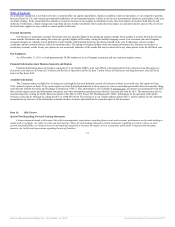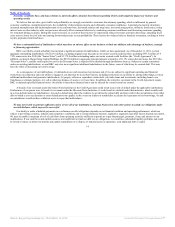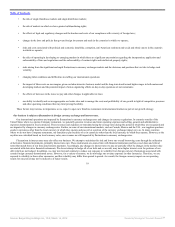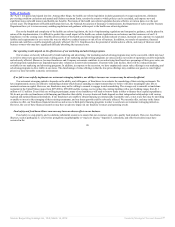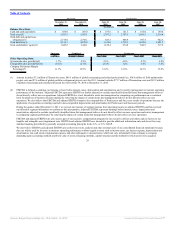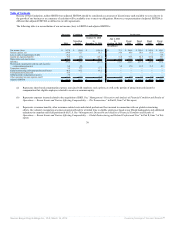Burger King 2011 Annual Report Download - page 22
Download and view the complete annual report
Please find page 22 of the 2011 Burger King annual report below. You can navigate through the pages in the report by either clicking on the pages listed below, or by using the keyword search tool below to find specific information within the annual report.
Table of Contents
food industry in the past, and could occur in the future. Furthermore, our reliance on third-party food suppliers and distributors increases the risk that food-borne
illness incidents could be caused by factors outside of our control and that multiple locations would be affected rather than a single restaurant. New illnesses
resistant to any precautions may develop in the future, or diseases with long incubation periods could arise, such as mad cow disease, which could give rise to
claims or allegations on a retroactive basis. Any report or publicity linking us or one of our franchisees to instances of food-borne illness or other food safety
issues, including food tampering or contamination, could adversely affect our brands and reputation as well as our revenues and profits. Outbreaks of disease, as
well as influenza, could reduce traffic in our stores. If our customers become ill from food-borne illnesses, we could also be forced to temporarily close some
restaurants. In addition, instances of food-borne illness, food tampering or food contamination occurring solely at restaurants of competitors could adversely
affect our sales as a result of negative publicity about the foodservice industry generally.
The occurrence of food-borne illnesses or food safety issues could also adversely affect the price and availability of affected ingredients, which could
result in disruptions in our supply chain, significantly increase our costs and/or lower margins for us and our franchisees. In addition, our industry has long been
subject to the threat of food tampering by suppliers, employees or guests, such as the addition of foreign objects in the food that we sell. Reports, whether or not
true, of injuries caused by food tampering have in the past severely injured the reputations of restaurant chains in the quick service restaurant segment and could
affect us in the future as well.
Our results can be adversely affected by unforeseen events, such as adverse weather conditions, natural disasters or catastrophic events.
Unforeseen events, such as adverse weather conditions, natural disasters or catastrophic events, can adversely impact our restaurant sales. Natural disasters
such as earthquakes, hurricanes, and severe adverse weather conditions and health pandemics, such as the outbreak of the H1N1 flu, whether occurring in the
United States or abroad, can keep customers in the affected area from dining out and result in lost opportunities for our restaurants. Because a significant portion
of our restaurant operating costs is fixed or semi-fixed in nature, the loss of sales during these periods hurts our operating margins and can result in restaurant
operating losses.
Shortages or interruptions in the availability and delivery of food, beverages and other supplies may increase costs or reduce revenues.
We and our franchisees are dependent upon third parties to make frequent deliveries of perishable food products that meet our specifications. Shortages or
interruptions in the supply of food items and other supplies to our restaurants could adversely affect the availability, quality and cost of items we buy and the
operations of our restaurants. Such shortages or disruptions could be caused by inclement weather, natural disasters such as floods, drought and hurricanes,
increased demand, problems in production or distribution, the inability of our vendors to obtain credit, food safety warnings or advisories or the prospect of such
pronouncements, or other conditions beyond our control. A shortage or interruption in the availability of certain food products or supplies could increase costs
and limit the availability of products critical to restaurant operations.
Four distributors service approximately 85% of our U.S. system restaurants and in many of our international markets, we have a single distributor that
delivers products to all of our restaurants. Our distributors operate in a competitive and low-margin business environment. If one of our principal distributors is in
financial distress and therefore unable to continue to supply us and our franchisees with needed products, we may need to take steps to ensure the continued
supply of products to restaurants in the affected markets, which could result in increased costs to distribute needed products. If a principal distributor for our
Company restaurants and/or our franchisees fails to meet its service requirements for any reason, it could lead to a disruption of service or supply until a new
distributor is engaged, which could have an adverse effect on our business.
21
Source: Burger King Holdings Inc, 10-K, March 14, 2012 Powered by Morningstar® Document Research℠



